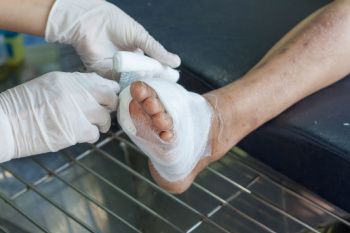
Foot ulcers, particularly common among individuals with diabetes or neuropathy, can have serious consequences if left untreated. These ulcers often start with calluses formed from repeated pressure or friction on the foot. As the skin thickens, the callus can press into the foot, killing healthy tissue and causing pain. However, neuropathy may prevent you from feeling this pain, making it harder to detect the problem early. Red, hot spots are initial signs of pressure or ill-fitting footwear. If not addressed, these can develop into blisters, corns, or calluses. Once a callus digs into the foot, it can create open wounds or ulcers, which serve as entry points for infection. Infected ulcers might discharge fluids, bleed, or emit a bad odor, and the surrounding skin may become red and warm. It's of extreme importance to address these issues promptly to prevent gangrene or limb loss. A podiatrist plays a key role in managing and preventing foot ulcers by providing specialized wound care, such as removing dead tissue. If you have developed foot ulcers, it is suggested that you make an appointment with a podiatrist for an exam and wound care options.
Wound care is an important part in dealing with diabetes. If you have diabetes and a foot wound or would like more information about wound care for diabetics, consult with Dr. Ronald Sheppard from Warren-Watchung Podiatry Center. Our doctor will assess your condition and provide you with quality foot and ankle treatment.
What Is Wound Care?
Wound care is the practice of taking proper care of a wound. This can range from the smallest to the largest of wounds. While everyone can benefit from proper wound care, it is much more important for diabetics. Diabetics often suffer from poor blood circulation which causes wounds to heal much slower than they would in a non-diabetic.
What Is the Importance of Wound Care?
While it may not seem apparent with small ulcers on the foot, for diabetics, any size ulcer can become infected. Diabetics often also suffer from neuropathy, or nerve loss. This means they might not even feel when they have an ulcer on their foot. If the wound becomes severely infected, amputation may be necessary. Therefore, it is of the upmost importance to properly care for any and all foot wounds.
How to Care for Wounds
The best way to care for foot wounds is to prevent them. For diabetics, this means daily inspections of the feet for any signs of abnormalities or ulcers. It is also recommended to see a podiatrist several times a year for a foot inspection. If you do have an ulcer, run the wound under water to clear dirt from the wound; then apply antibiotic ointment to the wound and cover with a bandage. Bandages should be changed daily and keeping pressure off the wound is smart. It is advised to see a podiatrist, who can keep an eye on it.
If you have any questions, please feel free to contact one of our offices located in Marlboro and Watchung, NJ . We offer the newest diagnostic and treatment technologies for all your foot care needs.
